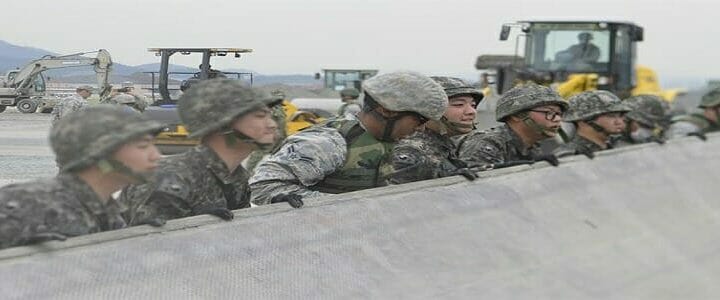You knew they would start eventually. While it took longer than I originally predicted, the North Koreans have begun to return to form. North Korea has made a show of criticizing U.S.-Republic of Korea military exercises. It has also used them as an excuse to either test a new missile or detonate a nuclear warhead.
In March, as details of the offer to talk peace began to filter out of Korea, South Korea’s national security advisor Chung Eui-yong assured the U.S. that Chairman Kim Jong-un “could understand why the joint exercises must resume in April on the same scale as before.” Two exercises, named Foal Eagle and Key Resolve, were postponed until April due to the Winter Olympics. They were executed in April without incident.
Another regularly planned air force exercise, Max Thunder, began last week. On Tuesday, North Korea started to backtrack, saying Max Thunder endangers the planned June 12 summit in Singapore between Kim and President Donald Trump.
As second statement from diplomat Kim Kye-gwan, took aim squarely at the new national security advisor Amb. John Bolton.
“rude and wicked provocation”
When Kim met with South Korean President Moon Jae-in at the “Truce Village” in Panmunjom, the Joint Security Area within the Demilitarized Zone separating the two Koreas, the leaders pledged to “make joint efforts to alleviate the acute military tension and practically eliminate the danger of war on the Korean Peninsula.” Apparently, Max Thunder, despite being an annual endeavor, was too much for Pyongyang to take.
“The DPRK-targeted drill across South Korea is an undisguised challenge to the Panmunjom Declaration and a deliberate military provocation to the trend of the favorably developing situation on the Korean Peninsula,” the Korean Central News Agency said on Wednesday. It went on to say “before the ink of the historic April 27 Declaration got dry, the South Korean authorities and the U.S. started such a drill against the DPRK, reacting to all the peace-loving efforts and good intentions which the DPRK has shown with rude and wicked provocation and arousing serious concern and disappointment among all the fellow countrymen and the international community wanting the declaration to be implemented.”
Am I the only one who reads North Korean polemics and thinks immediately of John Candy’s role as Tom Tuttle from Tacoma in Volunteers, his 1985 buddy movie with Tom Hanks?
All is probably not well in the hermit kingdom
In many respects, these developments are entirely to be expected. No one actually believed the road to Singapore would be a smooth one, or even that it would lead there at all. The main questions were how quickly the Kim regime would change course, and how far from the ultimate goal that course correction would take the process.
But the more I reflect on the fiery rhetoric of the past few days, the more I think it indicates a deeper problem within the DPRK. Kim Jong-un is still young—still in his mid-thirties, although the exact year of his birth is unclear. But the defense minister Gen. Pak Yong-sik is 68, born the year the Korean War broke out. Kim may well be ready to launch a new era in North-South relations, but it’s doubtful his generals are.
Could there be a power struggle in Pyongyang?
Think about it: as the supreme ruler, Kim stands to lose little in the way of power and privilege by forging a lasting peace with the ROK. But for the military leadership and other members of Korea’s own military-industrial complex, peace is not a good thing.
In the 1980s, there were rumors of Soviet generals prolonging the country’s occupation long after it was clear the mujaheddin would win, because if there’s one thing that is universal, it’s that combat tours are good for promotion. The DPRK’s biggest industry is its military. For its leaders, a sudden onset of peace threatens the lifestyle to which they’ve become accustomed.
And tellingly, Kim Kye-gwan’s statement, wherein he said of Bolton, “we do not hide our feeling of repugnance towards him,” was made in his own name. Nowhere did he assert or even imply that he was speaking on behalf of the entire government. Kim Kae-gwan’s title is first vice-minister of foreign affairs, something roughly equivalent to the U.S. Deputy Secretary of State John J. Sullivan.
This statement may well have been a signal to the “Supreme Leader” that his military is not prepared to follow him down his chosen path. We ought hope not, but neither is it a possibility that one can dismiss out-of-hand.
Fasten your seatbelts. The ride is going to get much bumpier before things smooth out.



